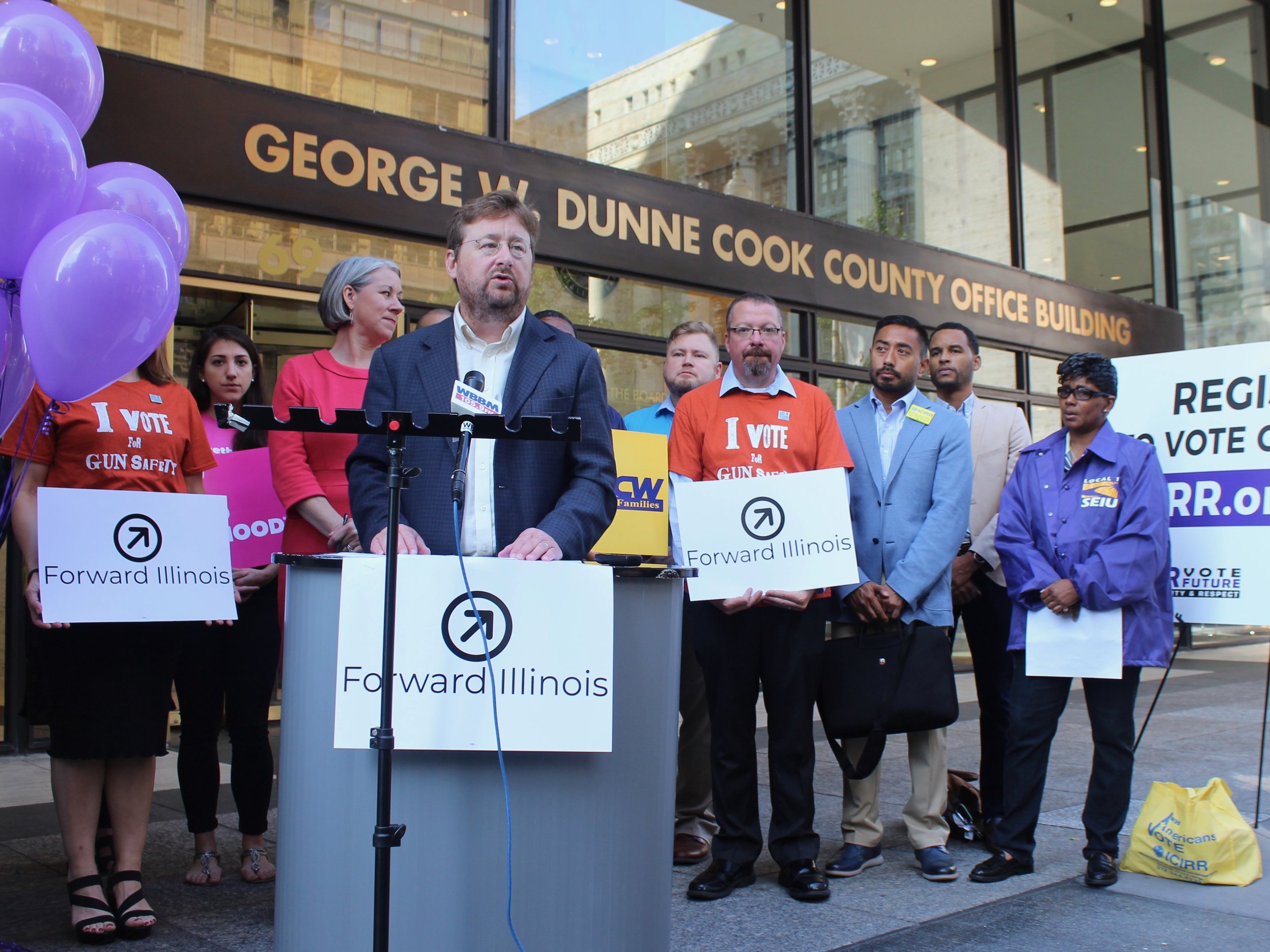Jail protesters for felony trespassing?
Sierra Club, House Progressive Caucus rip bill that would have ‘chilling effect on free speech’
Backed by state Rep. Delia Ramirez, Rep. Will Guzzardi speaks Thursday at a House Progressive Caucus news conference. (Blue Room Stream)
By Ted Cox
The Sierra Club’s Illinois Chapter joined progressives in the state House of Representatives Thursday in attacking a proposed new bill that would potentially jail protesters for felony trespassing.
At a news conference held by the House Progressive Caucus Thursday in the Capitol, Jack Darin, director of the Sierra Club Illinois Chapter, said House Bill 1633 was “being pushed by the fossil-fuel industry and right-wing think tanks across the country.”
Darin added that “the possibility that people are going to go to prison for being on the wrong side of the property line” would create “a chilling effect on free speech, on peaceful protest.”
“The possibility that people are going to go to prison for being on the wrong side of the property line” would create “a chilling effect on free speech, on peaceful protest.”
Sierra Club Illinois Chapter Director Jack Darin
State Rep. Will Guzzardi of Chicago, a member of the Progressive Caucus, said it would undermine “guaranteed access to free speech, people’s right to protest,” while also increasing criminal penalties, something the caucus is generally against.
“It’s really targeted at peaceful protesters,” Guzzardi said. “It’s a way to try to criminalize peaceful protest.”
The bill “creates the offense of criminal damage to a critical infrastructure facility for a person who knowingly damages, destroys, vandalizes, defaces, or tampers with equipment in a critical infrastructure facility,” and expands the definition of such a facility from nuclear plants to “coal mines and any mining operation.” Violations would be considered a felony punishable by a $100,000 fine, imprisonment, or both. It also would hold organizations responsible for the actions of their members or associated protesters, with the possibility they could be charged with conspiracy.
According to Darin, the American Civil Liberties Union and NAACP are also opposed. Tabitha Tripp, of Southern Illinoisans Against Fracking Our Environment, has also raised issues over the criminal-conspiracy clause, pointing out that any environmental organization “that pays, sponsors, or funds any person in general could be subjected to a $1 million fine and … leadership would be subject to criminal penalties.”
“It’s much more broad than what some of its proponents have suggested,” Guzzardi said.
It was the only bill the Progressive Caucus actively opposed in what it called a news conference on “bill endorsements” on legislation pending in the General Assembly.
Otherwise, Rep. Carol Ammons of Champaign-Urbana spoke in favor of House Bill 2040, sponsored by Rep. Kelly Cassidy of Chicago, which would prohibit turning shuttered state prisons into private detention centers potentially for use on undocumented immigrants, as is being considered in Dwight.
“We don’t want to take our corrections facilities and turn them into private detention centers,” Ammons said.
Rep. Delia Ramirez of Chicago also spoke in favor of her House Bill 3331, which would expand the 20-year-old Homelessness Prevention Program, saying, “We have to prevent homelessness, not just delay it.”
The caucus said it was also pursuing additions to the bill legalizing marijuana to make it “equitable in a socially just way,” Guzzardi said, advocating measures that would give minority communities that bore the brunt of the “War on Drugs” a stake in the legal market.
“This caucus definitely has concerns about equity provisions in that bill,” Ammons said. Calling for “community benefit funds,” she added, “We have concerns about economic inclusion.”
Asked about whether that and other caucus bills amount to “socialism,” Ammons called that “a boogeyman kind of concept.”
“We believe in equity for all. We believe in justice for all. We believe in democracy for all. We believe in health care for all,” Ammons said. “I think it’s very American.”


